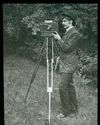Fixed smartphone lenses can be limiting, which is why Zeiss and ExoLens have partnered to create a set of three add-on lenses for Apple iPhones. Richard Sibley gives them a try

For a generation of young photographers, their smartphone is their first, and often only, camera. The reduction in image quality, thanks to the smaller sensors in smartphones, seems to matter little to those for whom portability and instant results are more important. Another limitation is the lens. Or, at least, it was.
Although there are already numerous conversion lenses that convert the fixed focal length lens on a smartphone to achieve a wider or narrower field of view, most of these reduce the image quality even further. The ExoLens range, with optics by Zeiss, is set to change all this. Yes, you read correctly: you can get Zeiss lenses for your smartphone.
Three conversion lenses are available. The first is a 0.6x wideangle, which converts the 30mm lens of an iPhone to an equivalent of around 18mm. Next up is a 2x telephoto, offering a 60mm equivalent. Finally a zoom-macro lens has the ability to change the close-focusing distance.
Each lens has a sturdy metal housing, front and rear lens caps, as well as lens hoods. It really is like looking at a miniature set of Zeiss lenses, complete with the legendary blue Zeiss logo emblazoned on the side.
To top it all off, the lenses are fitted to a smartphone via a lightweight but extremely rigid machined aluminium bracket. As well as providing a screw thread for the lenses to be mounted, it has an accessory shoe mount for either a small LED light or microphone, as well as a tripod thread on the bottom. Currently, there are brackets for the iPhone 6, 6+, 6S, 6S+ and 7. Because it has such a slim profile, the mount can remain on your phone at all times, and all three lenses fit easily in a coat pocket.
This story is from the {{IssueName}} edition of {{MagazineName}}.
Start your 7-day Magzter GOLD free trial to access thousands of curated premium stories, and 9,000+ magazines and newspapers.
Already a subscriber ? Sign In
This story is from the {{IssueName}} edition of {{MagazineName}}.
Start your 7-day Magzter GOLD free trial to access thousands of curated premium stories, and 9,000+ magazines and newspapers.
Already a subscriber? Sign In

140 years of change
AP has become the world’s oldest surviving consumer photo magazine because we have moved with the times, says Nigel Atherton

Preserving history in platinum
A deep dive into the meticulous art of platinum printing, and the collaboration between the Royal Geographical Society and Salto Ulbeek. Mike Crawford explores how they brought historical photographs to life with enduring beauty and precision

Life in the past lane
What was life like for an amateur photographer in 1884? John Wade takes a trip back in time

Choice cuts
How many trillions of photographs must have been taken in the past 140 years? Amy Davies asked some of our regular contributors for their favourites....a difficult task, to say the least

How good a camera can you buy for just £140?
Three members of the AP team see what they can find for the money

Round Five: The Best of the Rest
The APOY judges choose their favourite images that didn’t make the top ten of our Landscapes category

Amateur Photographer of the Year
Here are the top ten images uploaded to Photocrowd from Round Five, Landscapes, with comments by the AP team and our guest judge

FILM STARS A lifetime of landmarks
Cameras that hit the headlines between then and now. John Wade is your guide

140 years of Amateur Photographer
As AP celebrates its 140th birthday next month, Nigel Atherton looks back at its glorious past

John Wade considers...World War II: Home Front 1940, by A.J O'Brien
Say the word 'Wall's' to those of a certain age and two things spring to mind: sausages and ice cream.